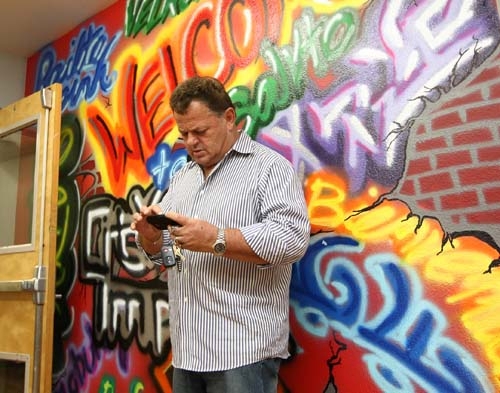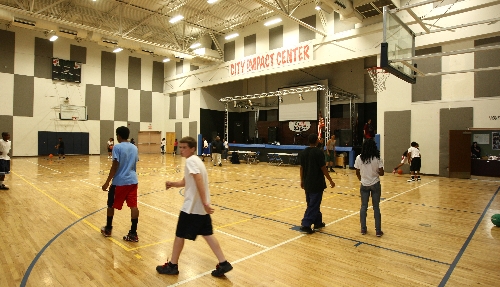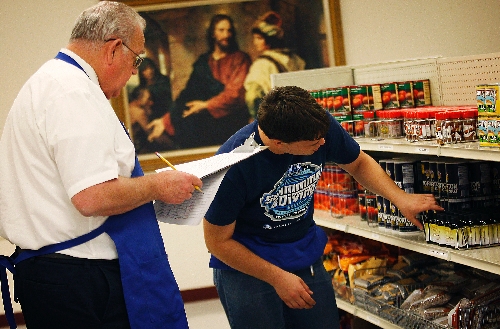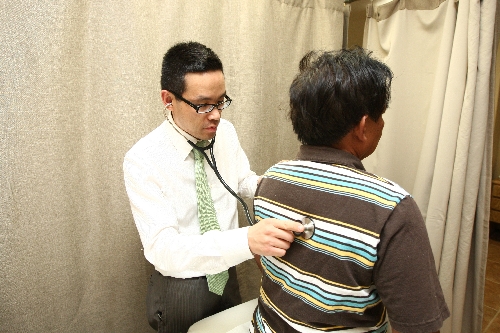Houses of worship struggle in tight times





About six weeks ago, the Rev. Vic Caruso said goodbye to some members of his church.
"They’re a really strong couple who are really big in the convention business," said Caruso, senior associate pastor of Trinity Life Center. "They’re moving back to Texas. They had to short sell their home."
Last weekend, Caruso again found himself saying goodbye, this time to a couple who have been members of the church for more than 20 years. They were moving back to Nebraska, Caruso said, "because there was work there."
Caruso estimated that Trinity Life Center, 1000 E. St. Louis Ave., has lost 10 percent to 12 percent of its members during the past two years or so because of job losses or recession-related foreclosures that forced them to leave town.
The disappearance of familiar faces from the pews is just one of the ways in which the recession has hit Southern Nevada’s religious congregations. From donation decreases to increases in requests for aid both practical and spiritual, the recession has been as challenging for houses of worship as it has been in the households of worshippers.
Many valley churches have seen the recession reflected in the collection plate. When times get tough, some members "will cut out (religious) giving, because that’s kind of discretionary," said Laurie Valkenburg, bookkeeper at Community Lutheran Church, 3720 E. Tropicana Ave.
Valkenburg began to notice signs of an impending economic slowdown about 2½ years ago. Since then, she said, collections at the church have been down "maybe 40 percent."
The church has let go about one-third of its staff, Valkenburg said, and the 25 or so full- and part-time employees who remain have switched from five-day workweeks to four-day, 10-hour-a-day workweeks in an effort to keep utility costs in check.
The church currently has about 3,400 members, Valkenburg noted, but weekly attendance has dropped from about 1,300 two years ago to about 1,100 now.
Rabbi Yocheved Mintz of Valley Outreach Synagogue-P’Nai Tikvah said her congregation has been "severely affected by the recession."
The congregation has about 70 families and "is not wealthy," Mintz said. While membership is slightly up from a year or two ago, the recession has forced congregants to pare back giving, and Mintz knows "a number of congregants who have had to either downsize or have lost their homes altogether."
The recession also has put on hold the congregation’s plans to find a permanent worship space, Mintz said. And while there have been no layoffs or staffing reductions, that’s only, she joked, because "we run on a broken shoestring to begin with."
Caruso estimated that collections at Trinity Life Center — which he said currently has about 600 members — have dropped about 20 percent during the past two years because of reductions in members’ income. Members continue to give, he said, but they can’t afford to give at their previous levels.
In the meantime, the church has imposed pay cuts of about 20 percent for most staff and "30 percent for us main guys," Caruso said. In addition, eight staff members — including the wives of Caruso and Senior Pastor Randy Greer — have been laid off. The church now has four full-time pastors, down from 12 two years ago, Caruso noted, while its support staff has shrunk from about eight people to three.
Caruso said the nature of Las Vegas’ workforce also has contributed to the church’s financial challenges.
"We have a lot of people who are tip-based, and then you have a ton of people who are commission-based," he said. "Both of those have been just devastated.
"For years, we would just out of the clear blue get nice big offerings from someone who sold a home or got some extra revenue. But that has all dried up."
The Rev. Ralph E. Williamson, senior pastor of First African Methodist Episcopal Church, 2446 Revere St., North Las Vegas, considers his nearly 900-member church lucky to have seen a drop in donations of "no more than 15 percent" during the past two years.
Still, the shortfall did force Williamson and his staff to "figure out how to streamline some of the things we were doing" and impose cost savings measures that range from cutting back on grounds maintenance to keeping a more watchful eye on office supply expenditures.
Members of the Church of Jesus Christ of Latter-day Saints are asked to tithe, or offer a percentage of their income to the church. Southern Nevada church spokesman Todd Moody said that, with job losses, pay cuts and reductions in work hours among members, such earnings-tied contributions "have probably gone down" during the past two years.
Moody estimated that the church has about 200,000 members here, a number that, he said, has remained "surprisingly constant" over the past few years.
At Green Valley Presbyterian Church, the Rev. Kenneth C. Harper said he feels fortunate that contributions there have "remained flat but stable over the last several years."
The church, at 1798 Wigwam Parkway in Henderson, has about 550 active adult members, said Harper, its pastor, and job losses have resulted in some church members canceling or reducing pledges of financial support. But at the same time, he added, other members — among them, retirees who have seen their investment portfolios rebound — "have stepped up, particularly in the last year or so."
Coupled with lighter collection plates, valley clergy members have been seeing more requests for aid from economically ravaged congregants. Williamson said the food distribution program at his church has seen "a major increase" in use, from about 70 families a week a few years ago to an average of 210 families a week now.
"We’re open from 10 o’clock to 1 o’clock, and they start lining up as early as 7 o’clock," he said.
LDS church leaders ask members to keep a supply of food and other goods on hand to use during hard times. Moody said that, during this recession, "we’ve seen a lot of members" access their stored provisions.
When that’s not enough, the LDS church maintains bishops’ storehouses where members may receive food and other provisions with a bishop’s authorization. Requests for use of the storehouses here has risen, said Moody, who could not offer a percentage estimate but said the increase "has been proportional to those that find themselves out of work" or who have experienced income reductions.
The recession’s financial challenges have brought spiritual challenges, too, and clergy members say they’ve been busy counseling hard-hit members of their congregations.
"We have been aware of the extra challenges, not just monetary but emotional, of the (economic) trends here in the valley," Mintz said, and job losses, foreclosures and other financial stresses have "taken not just an economic toll but a huge emotional toll."
"You have to remember that the church is really the only trusted institution that we have in America," Williamson said. "So people come to the places where they can find (people who) are not preying on them but praying for them."
But even amid the practical and spiritual damage the recession has left in its wake, clergy members have noticed the occasional blessing. For example, the recession has helped to underscore what religious community is all about.
"I’m in a parish that doesn’t have a lot of money," said the Rev. Dave Casaleggio, administrator of St. Anne Catholic Church, 1901 S. Maryland Parkway. "It’s good-sized, but it doesn’t have a lot of money. We don’t get the collection amounts other parishes do."
The parish has about 2,500 registered families, although Casaleggio said actual Mass attendance reflects numbers greater than that. Over the four years he has been at St. Anne, Casaleggio estimates that Mass attendance has increased by at least 10 percent, and maybe even by as much as 20 percent.
And, during those four years, "our collections have gone up," Casaleggio said. "We were getting maybe $7,000 a week when I first came, and we’re up to an average of $9,000 or $10,000 weekly."
Casaleggio chalks that up to simply "talking to people" about the recession-fueled challenges faced by fellow parishioners and the parish itself. Casaleggio said his message to parishioners is that "if you’re not working, you shouldn’t give anything. If you are, maybe you should think about kicking in a little more for those who can’t."
Harper said the recession probably let Green Valley Presbyterian Church build an education building more affordably than it might have a few years ago.
The project was begun before the recession hit, he said. But, faced with the imminent expiration of construction paperwork, the congregation decided to forge ahead anyway and dedicated its new building in June 2010.
The project totaled about $1 million, Harper said. "In one respect, the silver lining was, contractors were eager for work so the bidding was very competitive. I’m sure we built the building for less money than we would have five years ago."
At Trinity Life Center, the recession forced the church to close its elementary and high schools three years ago when parents no longer could afford to pay their kids’ tuition. But, Caruso said, that, in turn, led to the creation of City Impact Center, a campus on which nonprofit organizations make a raft of services — from medical and dental care for people without insurance to after-school programs for neighborhood youth — available to low-income community residents.
Caruso said City Impact Center has been a longtime dream of Greer’s. The recession, and the negative effect it has had on both the church’s finances and the community, probably accelerated what otherwise would have been a more gradual transformation, he said.
"We’ve always wanted to do this, but we never got it off the ground because the need wouldn’t have been as strong," Caruso said.
Even during this recession, "we’ve been very blessed," Caruso added. "You can’t go wrong when you’re blessing the poor."
Contact reporter John Przybys at jprzybys@ reviewjournal.com or 702-383-0280.












